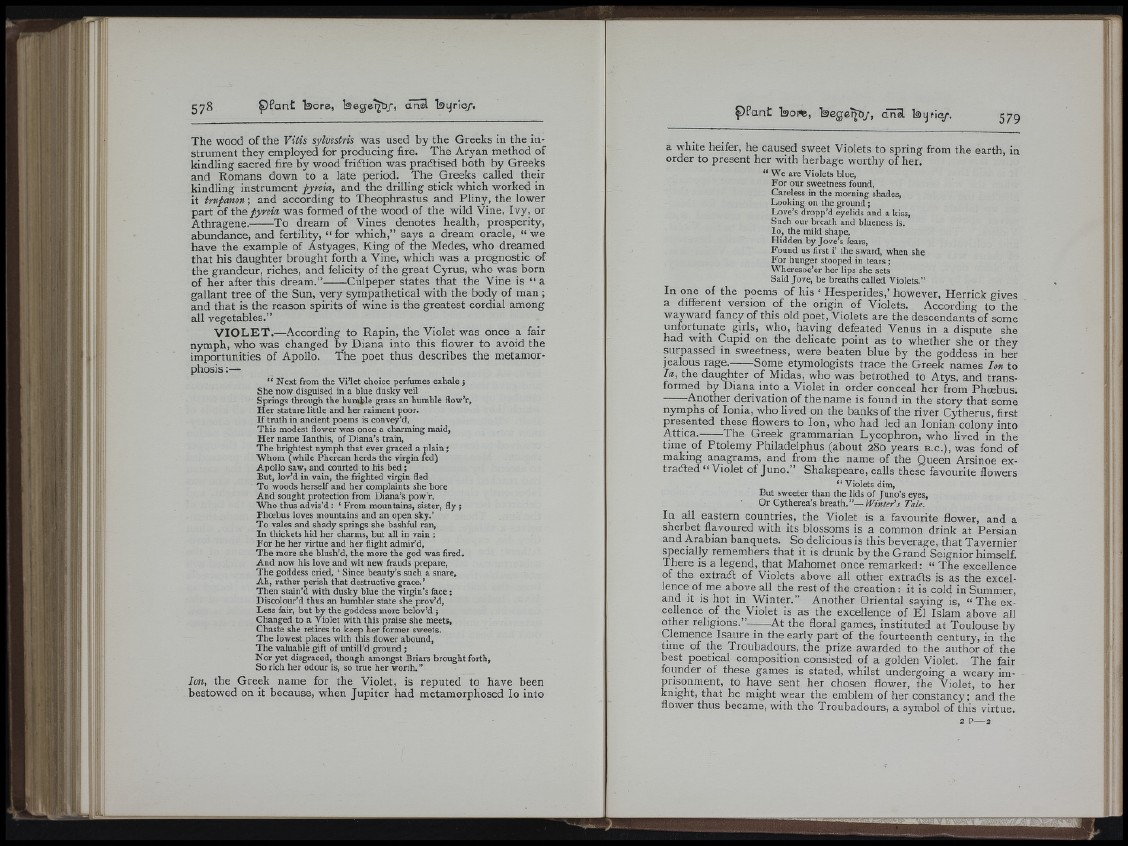
: fe i :
- ÍK'
t
Î
i 1
The wood of the Vitis sylvestris was used by the Greeks in the instrument
they employed for producing fire. The Aryan method of
kindling sacred fire by wood fricflion was pracflised both by Greeks
and Romans down to a late period. The Greeks called their
kindling instrument pyreia, and the drilling stick which worked in
it trupanon ; and according to Theophrastus and Pliny, the lower
part of the pyreia was formed of the wood of the wild Vine, Ivy, or
Athragene. To dream of Vines denotes health, prosperity,
abundance, and fertility, “ for which,” says a dream oracle, “ we
have the example of Astyages, King of the Medes, who dreamed
that his daughter brought forth a Vine, which was a prognostic of
the grandeur, riches, and felicity of the great Cyrus, who was born
of her after this dream.” Culpeper states that the Vine is “ a
gallant tree of the Sun, very sympathetical with the body of man ;
and that is the reason spirits of wine is the greatest cordial among
all vegetables.”
V IO L E T .—According to Rapin, the Violet was once a fair
nymph, who was changed by Diana into this flower to avoid the
importunities of Apollo. The poet thus describes the metamorphosis
“ Next from the Vi'let choice perfumes exhale ;
She now disguised in a blue dusky veil
Springs through the humjple grass an humble flow'r,
Her stature little and her raiment poor.
I f truth in ancient poems is convey'd,
This modest flower was once a charming maid,
Her name lanthis, of Diana's train,
The brightest nymph that ever graced a plain ;
"Whom (while Pherean herds the virgin fed)
Apollo saw, and courted to his bed ;
But, lov'd in vain, the frighted virgin fled
To woods herself and her complaints she bore
And sought protection from Diana's powV,
Who thus advis’d : ‘ From mountains, sister, fly ;
Phoebus loves mountains and an open sky.'
T o vales and shady springs she bashful ran,
In thickets hid her charms, but all in vain :
For he her virtue and her flight admir'd,
The more she blush'd, the more the god was fired.
And now his love and wit new frauds prepare,
The goddess cried, ‘ Since beauty’s such a snare.
Ah, rather perish that destructive grace.'
Then stain'd with dusky blue the virgin's face :
Discolour'd thus an humbler state she prov'd,
Less fair, but by the goddess more belov'd ;
Changed to a Violet with this praise she meets,
Chaste she retires to keep her former sweets.
The lowest places with this flower abound.
The valuable gift of untill'd ground ;
Nor yet disgraced, though amongst Briars brought forth,
So rich her odour is, so true her worth.”
loity the Greek name for the Violet, is reputed to have been
bestowed on it because, when Jupiter had metamorphosed lo into
* Ji..
a white heifer, he caused sweet Violets to spring from the earth, in
order to present her with herbage worthy of her.
“ We are Violets blue,
For our sweetness found,
Careless in the morning shades.
Looking on the ground ;
Love's dropp’d eyelids and a kiss,
Such our breath and blueness is.
lo, the mild shape,
Hidden by Jove's fears,
Found us first i' the sward, when she
For hunger stooped in tears ;
Wheresoe'er her lips she sets
Said Jove, be breaths called Violets.”
In one of the poems of his ‘ Hesperides,’ however, Herrick gives
a different version of the origin of Violets. According to the
wayward fancy of this old poet, Violets are the descendants of some
unfortunate girls, who, having defeated Venus in a dispute she
had with Cupid on the delicate point as to whether she or they
surpassed in sweetness, were beaten blue by the goddess in her
jealous rage. Some etymologists trace the Greek names Ion to
la, the daughter of Midas, who was betrothed to Atys, and transformed
by Diana into a Violet in order conceal her from Phoebus.
Another derivation of the name is found in the story that some
nymphs of Ionia, who lived on the banks of the river Cytherus, first
presented these flowers to Ion, who had led an Ionian colony into
Attica. The Greek grammarian Lycophron, who lived in the
time of Ptolemy Philadelphus (about 280 years b .c . ) , was fond of
making anagrams, and from the name of the Queen Arsinoe ex-
traéted “ Violet of Juno.” Shakspeare, calls these favourite flowers
“ Violets dim.
But sweeter than the lids of Juno’s eyes,
Or Cytherea’s breath, Winter’s Tale.
In all eastern countries, the Violet is a favourite flower, and a
sherbet flavoured with its blossoms is a common drink at Persian
and Arabian banquets. So delicious is this beverage, that Tavernier
specially remembers that it is drunk by the Grand Seignior himself.
There is a legend, that Mahomet once remarked: “ The excellence
of the extrait of Violets above all other extraits is as the excellence
of me above all the rest of the creation: it is cold in Summer,
and it is hot in Winter.” Another Oriental saying is, “ The excellence
of the Violet is as the excellence of E l Islam above all
other religions.” At the floral games, instituted at Toulouse by
Clemence Isaure in the early part of the fourteenth century, in the
time of the Troubadours, the prize awarded to the author of the
best poetical composition consisted of a golden Violet. The fair
founder of these games is stated, whilst undergoing a weary imprisonment,
to have sent her chosen flower, the Violet, to her
kmght, that he might wear the emblem of her constancy; and the
flower thus became, with the Troubadours, a symbol of this virtue.
2 p— 2
»a* v««.^ ^ I